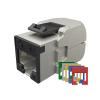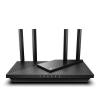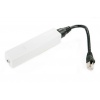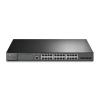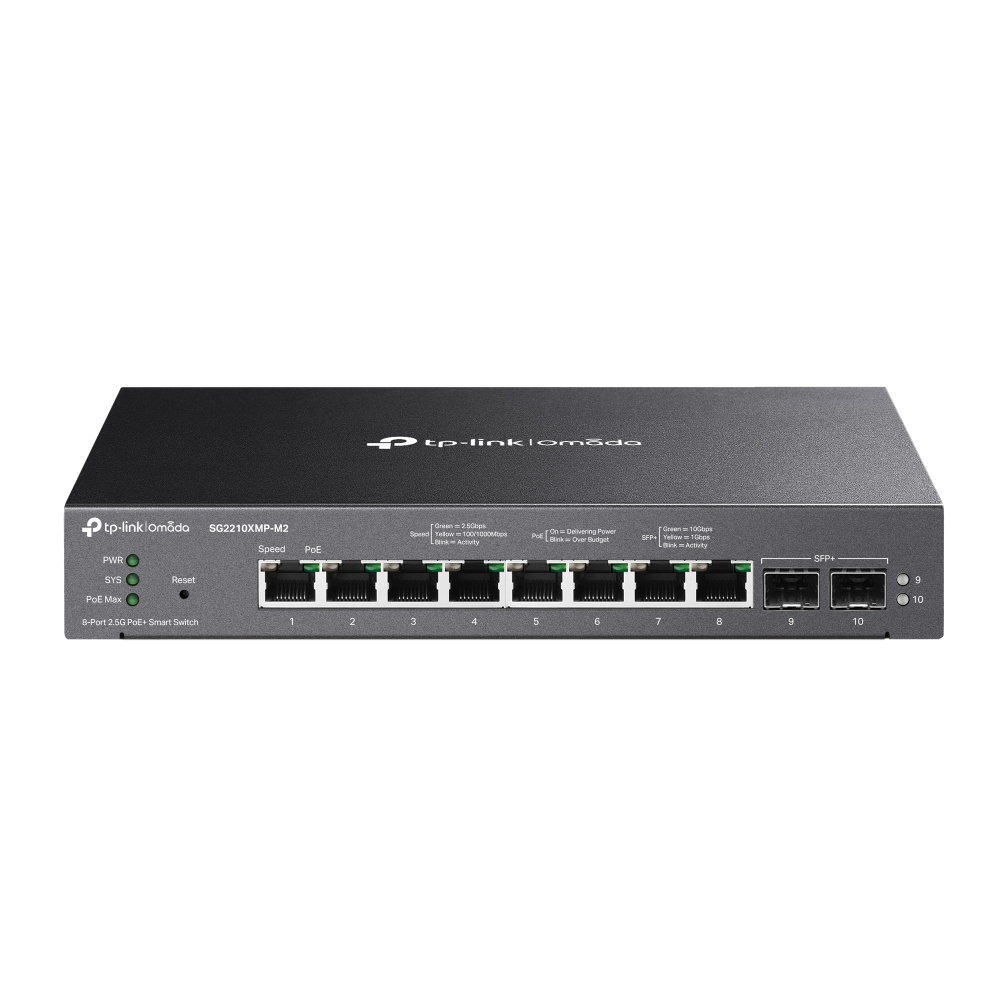-
Kč
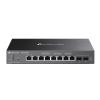
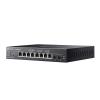
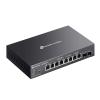
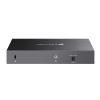
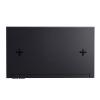
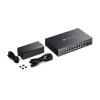
The TP-Link SG2210XMP-M2 is a managed switch compatible with the Omada system. It features 8 2.5G Ethernet ports and 2 SFP+ slots (10G). All Ethernet ports support PoE+ power output, delivering 15.4 W per port under the 802.3af standard or 30 W under 802.3at. The maximum total power budget across all ports is 160 W. This device is ideal for powering modern Wi-Fi 6E / Wi-Fi 7 access points equipped with 2.5G Ethernet ports. The SFP+ slots allow for 10 Gb/s optical links, enabling long-distance connections via fiber optic cables. The switch supports basic Layer 2 management features, along with select Layer 3 functions like static routing, DHCP server, and Proxy ARP. It comes in a desktop enclosure (for placement on a desk or shelf) but can also be wall-mounted if needed. The package includes an external 53.5 V DC / 3.37 A power supply, with a maximum power consumption of 180 W. You can manage the SG2210XMP-M2 via a graphical web interface (standalone mode) or through the Omada system.
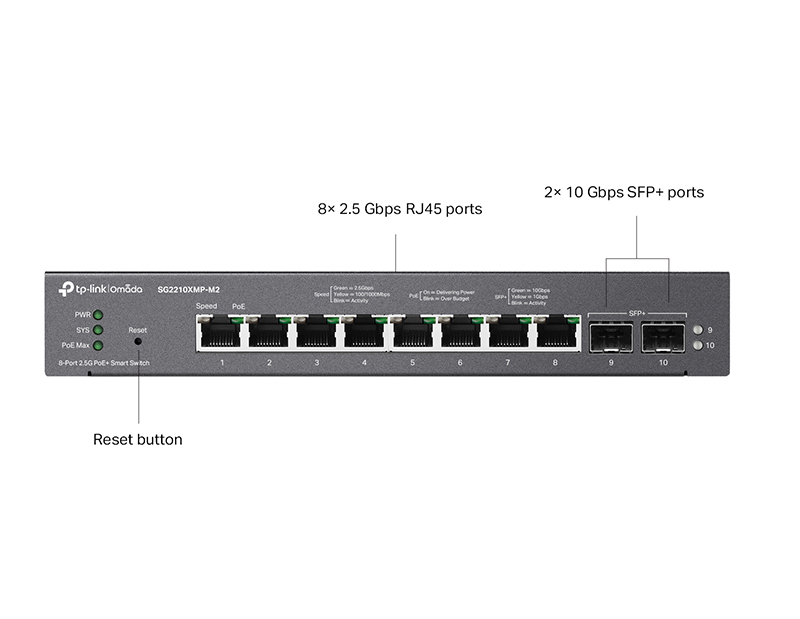
8x 2.5G Ethernet, 2x SFP+
The switch is equipped with 8 2.5G Ethernet ports and 2 SFP+ slots, allowing you to build a network infrastructure with a bandwidth of 2.5 Gb/s, offering significantly higher local network speeds compared to standard 1G solutions. The use of SFP+ slots enables a 10 Gb/s connection with the switch. Additionally, fiber optic cables offer much greater range than Ethernet cabling, which is crucial in certain locations (e.g., when connecting two office buildings).
8 PoE+ outputs, 160 W power budget
Each Ethernet port on the switch provides PoE+ power output. Depending on the protocol, the output is 15.4 W for 802.3af or 30 W for 802.3at. The total power budget across all ports is 160 W. The SG2210XMP-M2 is ideal for networks utilizing modern Wi-Fi 6E / Wi-Fi 7 access points equipped with 2.5G Ethernet ports. It allows these devices to be powered through Ethernet cabling while ensuring that network bandwidth is not limited.
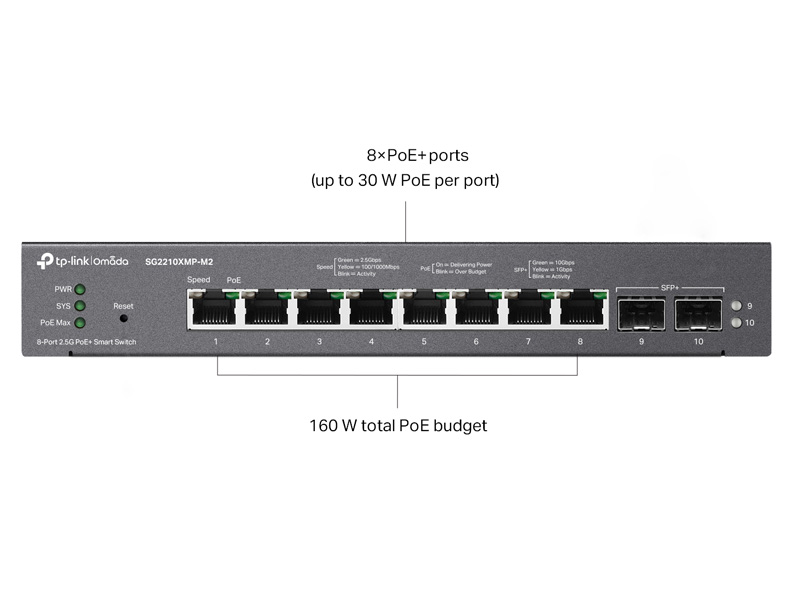
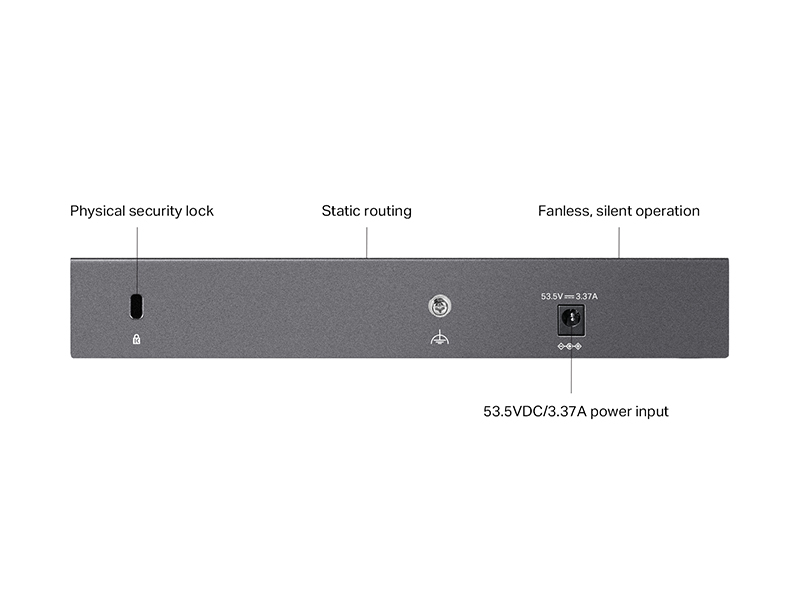
Layer2+ management, outer power adapter
The SG2210XMP-M2 supports Layer 2 management and basic Layer 3 functions. It includes features such as static routing, DHCP server, DHCP Relay, 802.1Q VLAN, port mirroring, Spanning Tree protocols, link aggregation, and 802.3x Flow Control. Additionally, it employs advanced security measures to protect your network from potential attacks.
The package includes an external 53.5 V DC / 3.37 A power supply. The maximum power consumption under full PoE load is 180.1 W.
Desktop Enclosure, Passive Cooling
The device is housed in a compact desktop enclosure, allowing it to be placed on a shelf or desk; rubber feet are included in the package. Optionally, the switch can be wall-mounted, but mounting screws must be purchased separately. The manufacturer has implemented passive cooling, ensuring that the device operates silently.
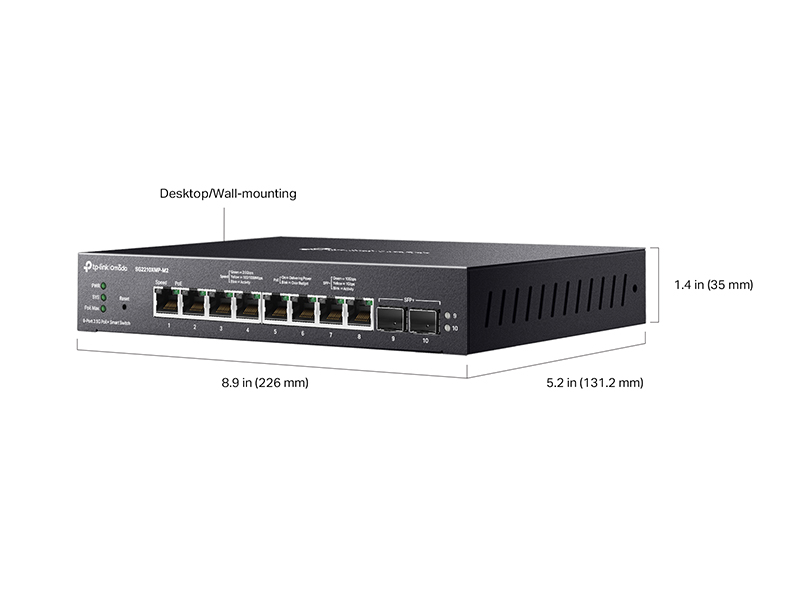
Compatibility with the Omada System
The device can be managed through a graphical web interface in standalone mode or via the Omada system. This system allows for centralized management of multiple access points, switches, and routers to create a unified, extensive wireless network. As you move between individual APs, you will be automatically switched without losing your Wi-Fi connection. Omada provides many advanced features related to network configuration and maintenance. It is designed for professional use in offices, restaurants, schools, universities, and retail stores.
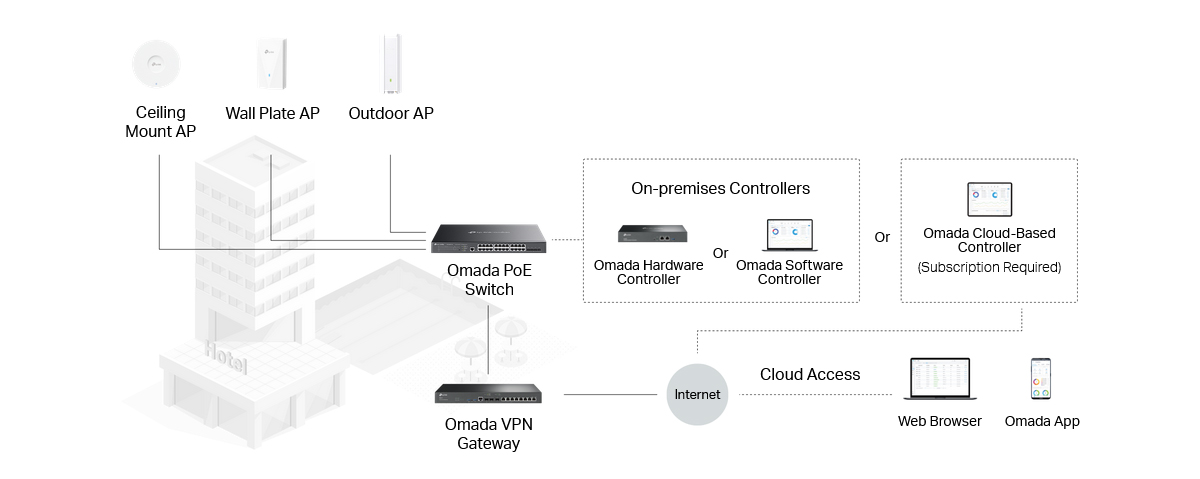
Specifications
| TP-Link SG2210XMP-M2 | |
| Hardware features | |
|---|---|
| Interface | 8× 100/1000/2500 Mbps RJ45 PoE+ Ports 2× 10G SFP+ Slots |
| Fan Quantity | Fanless |
| Physical Security Lock | Yes |
| Power Supply | 53.5VDC/3.37A Power Adapter |
| PoE Ports (RJ45) | Standard: 802.3at/af compliant PoE+ Ports: 8 Ports PoE Power Budget: 160 W |
| Dimensions ( W x D x H ) | 226 × 131 × 35 mm (8,9 × 5,2 × 1,4 cali) |
| Mounting | Desktop/Wall-Mounting |
| Max Power Consumption | 180.1 W (110V/60Hz) (with 160 W PD connected) |
| Max Heat Dissipation | 614.58 BTU/hr (110V/60Hz) (with 160 W PD connected) |
| Performance | |
| Switching Capacity | 80 Gb/s |
| Packet Forwarding Rate | 59,52 Mp/s |
| MAC Address Table | 16 K |
| Packet Buffer Memory | 12 Mb |
| Jumbo Frame | 9 KB |
| Software features | |
| Quality of Service | 802.1p CoS/DSCP priority 8 priority queues Priority Schedule Mode
Bandwidth Control
Storm Control
|
| L2 and L2+ Features | 32 IP Interfaces: Support IPv4/IPv6 Interface Static Routing: 32 IPv4/IPv6 Static Routes DHCP Server DHCP Relay
Static ARP Proxy ARP Gratuitous ARP Link Aggregation Spanning Tree Protocol Loopback Detection 802.3x Flow Control Mirroring Device Link Detect Protocol (DLDP) 802.1ab LLDP/ LLDP-MED |
| L2 Multicast | 511 IPv4, IPv6 shared multicast groups IGMP Snooping Multicast VLAN Registration (MVR) Multicast Filtering Limited IP Multicast (256 profiles and 16 entries per profile) |
| Advanced Features | Automatic Device Discovery Batch Configuration Batch Firmware Upgrading Intelligent Network Monitoring Abnormal Event Warnings Unified Configuration Reboot Schedule |
| VLAN | VLAN Group Max 4K VLAN Groups 802.1Q Tagged VLAN MAC VLAN: 12 Entries Protocol VLAN GVRP Voice VLAN |
| Access Control List | Support up to 230 entries Time-based ACL MAC ACL IP ACL IPv6 ACL Combined ACL Rule Operation: Permit/Deny Policy Action
|
| Security | IP-MAC-Port Binding AAA 802.1X
DHCP Filter Static/Dynamic/Permanent Port Security
Port Isolation Secure web management through HTTPS with SSLv3/TLS 1.2 Secure Command Line Interface (CLI) management with SSHv1/SSHv2 IP/Port/MAC based access control |
| IPv6 | IPv6 Static Routing and ACL IPv6 Dual IPv4/IPv6 IPv6 Interface Multicast Listener Discovery (MLD) Snooping IPv6 neighbor discovery (ND) Path maximum transmission unit (MTU) discovery Internet Control Message Protocol (ICMP) version 6 TCPv6/UDPv6 IPv6 applications
|
| MIBs | MIB II (RFC1213) Interface MIB (RFC2233) Ethernet Interface MIB (RFC1643) Bridge MIB (RFC1493) P/Q-Bridge MIB (RFC2674) RMON MIB (RFC2819) RMON2 MIB (RFC2021) Radius Accounting Client MIB (RFC2620) Radius Authentication Client MIB (RFC2618) Remote Ping, Traceroute MIB (RFC2925) Support TP-Link private MIB |
| Management | |
| Omada App | Yes. Requiring the use of Omada Hardware Controller, Omada Cloud-Based Controller, or Omada Software Controller. |
| Centralized Management | Omada Cloud-Based Controller Omada Hardware Controller Omada Software Controller |
| Cloud Access | Yes. Requiring the use of Omada Hardware Controller, Omada Cloud-Based Controller, or Omada Software Controller. |
| Zero-Touch Provisioning | Yes. Requiring the use of Omada Cloud-Based Controller. |
| Management Features | Web-based GUI Command Line Interface (CLI) through telnet SNMPv1/v2c/v3 SNMP Trap/Inform RMON (1,2,3,9 groups) SDM Template DHCP/BOOTP Client Dual Image, Dual Configuration CPU Monitoring Cable Diagnostics EEE SNTP System Log |
| Others | |
| Package Contents | SG2210XHP-M2 Switch Power Adapter Quick Installation Guide Rubber Feet |
| System Requirements | Microsoft® Windows® 98SE, NT, 2000, XP, Vista™ or Windows 7/8/10/11, MAC® OS, NetWare®, UNIX® or Linux. |
| Operating Temperature: | 0–40 ℃ (32–104 ℉); |
| Storage Temperature | -40–70 ℃ (-40–158 ℉) |
| Operating Humidity | 10–90% RH non-condensing |
| Storage Humidity | 5–90% RH non-condensing |






 Polski
Polski English
English Italiano
Italiano Español
Español Čeština
Čeština Српски
Српски Deutsch
Deutsch Ελληνικά
Ελληνικά Slovenský
Slovenský

